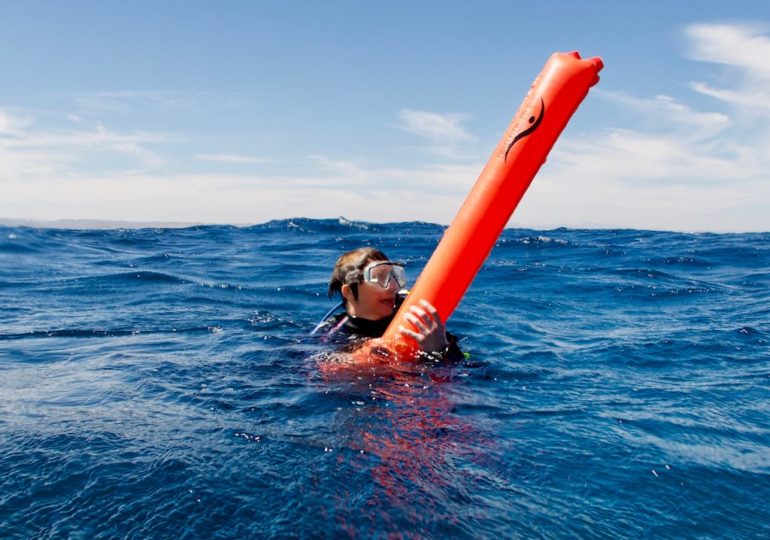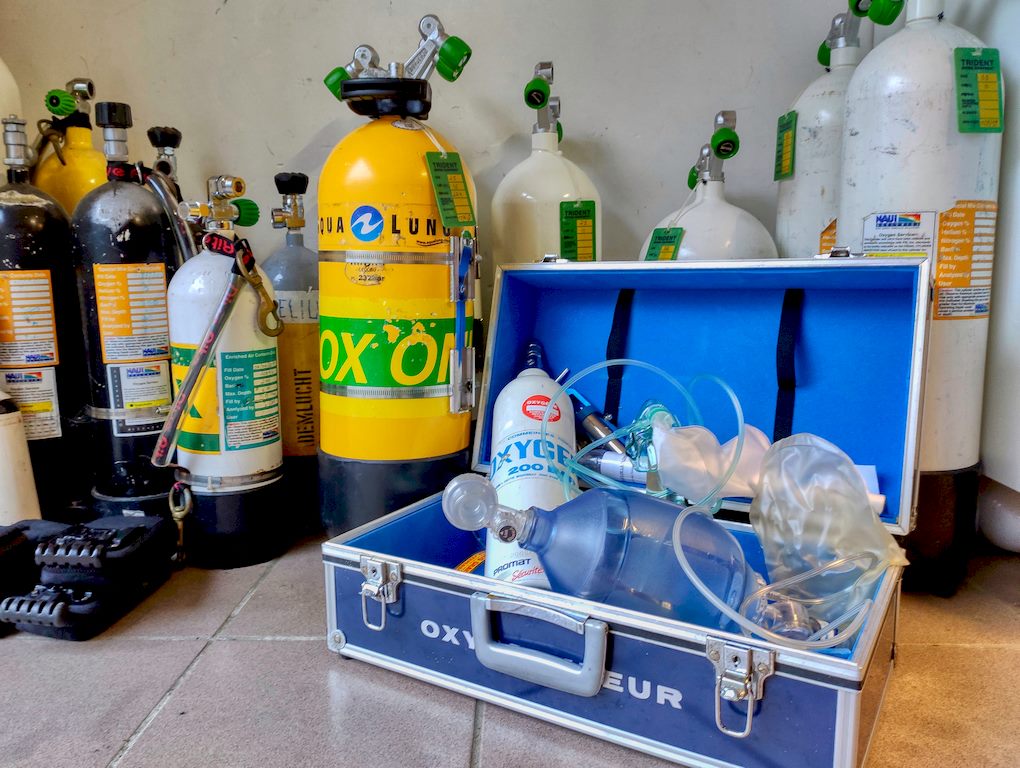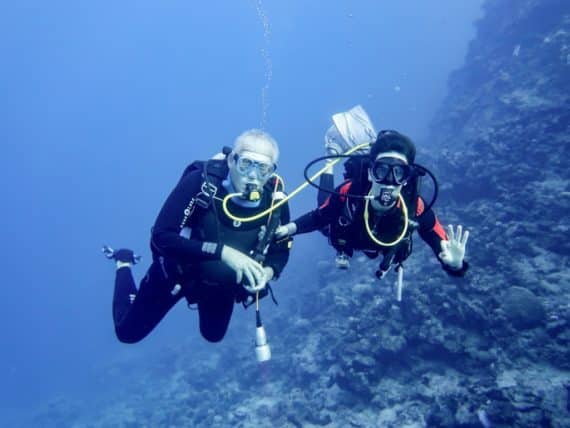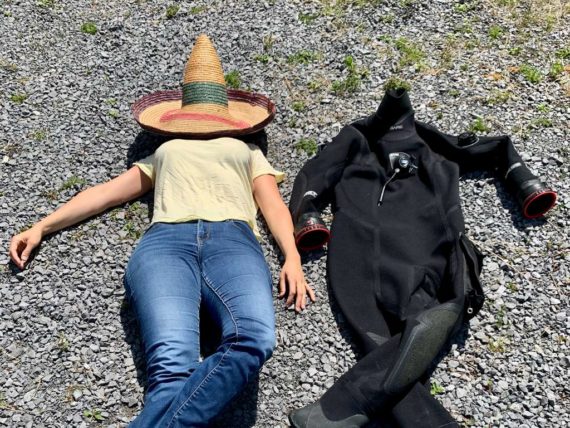Lost in the ocean : when the boat is no longer there

Lost in the ocean: when the boat is no longer there
The dreadful experience of being lost in the ocean is an experience that can occur in scuba diving. Also, through three real cases that have been reported to me, I propose to check how we can first prevent the loss of one or more divers in the ocean. But also, target the behaviors to have if we are lost one day.
Lost in the ocean: in Djibouti
A long time ago, Marc, a young instructor, took a diving cruise. With his team of three young divers, trained and experienced (Divemaster or more), they set off for a drift dive. When they reach the surface, at the planned location, there is no boat. After trying to reach the coast, they are swept away by a strong current and drift for more than 5 hours.
In these years, SMB were not part of the equipment. Also, they have no way to signal themselves. Their Imagination works at full speed: stress, inner dialogue and fear appear. The pain is there: thirst, fatigue, sunburns,… The team starts to go from bad to worse but the divers finally convince themselves that they are being searched. They then decide to strap each other to avoid getting lost and keep eye contact.
At nightfall, a small island appears in the axis. The current seems less strong and the divers make a last intense and long collective effort and mutual help.
They finally arrive safely on the coast, but completely exhausted and refrigerated.
By the time they get back on their feet and recover a little, it’s dark. After a waiting phase, they see a ship visibly looking over an area in the axis of the current. The divers put their torch into action and after a while the boat’s light beam search stops on “their” island. The ship approaches, a rib is put into the water, they are rescued.
Reason
Later, they learned that the rib of the main boat had gone to pick up two other teams and broke down. By the time the problem was resolved the divers had already drift away from the area… far, far away.
Lost in the ocean: in the English Channel
A few years ago, divers were on a wreck dive on a Saturday afternoon.
They’re warned. There will be no current on the wreck but probably during the ascent. The last to get into the water, Peter and Sandra, a couple of divers used to these conditions. They are invited for the occasion to join a local club. They are about to begin their ascent. Bottom times are respected but during the deco stop a violent current appears. The two divers are like a flag in a strong wind along the rope. Therefore, they have a hard time following the instruction of the captain: Ascent on the rope when you finish your dive. At the cost of some effort, they surface along the rope.
Surprise: no boat on the horizon.
The current is strong, very strong and the wind has picked up. They could see the coast but far far away and the current threatens to carry them out to sea. The wreck’s marking buoy is pulled by water and almost submerged. Peter straddles it and urges Sandra to come against him to make sure she is not swept away. The two divers keep their regulators in their mouths. After a time that seems infinitely long, Sandra asks Peter to shoot the SMB and get carried away by the current because she can no longer hold. Peter tells her to let go against him and he will hold for two.
The clock is ticking but Peter is convinced that it’s better not to get carried away by the current. He does not know what’s going on with the boat. Aware that they were the last in the water, he thought that they may have been “forgotten”. In this case, those on the boat will eventually find out and begin the search starting from the wreck. Moreover, from here you can still see the coast. And slowly the end of the day is coming. Finally, the boat reappears heading towards them.
Reason
The captain had taken the option of immediately recovering all the teams that did not ascent as planned and had made their deco stops in open water drifting far (very far) away and in a disparate manner.
Lost in the ocean: in the Caribbean
A family dive as a team of 4. Nathalie, an experienced diver, and her three children, Robin, Leah and Noah, aged 18 to 25. The dive director gives two options for diving on the same spot. First, dive to the west part of the pinacle to meet turtles but there will be current around – 30m. The second one, on the east part, more sheltered with a depth of – 20m and without major difficulties. They are on vacation to have fun. Nathalie choses the second option. The dive is going well. The water is warm, it’s the middle of the holidays and everyone is happy to dive together.
During the dive, a current appears. Nathalie shoots the SMB and decides to ascent. On the surface, she realizes that they are already far away. Taken behind the pinacle, they no longer have the boat in sight. Nathalie attaches the SMB to her BCD to keep signaling. And the whole family is holding hands. There’s no way they’re going to split up.
The young people sing and the waves are getting stronger. Robin, more sensitive than his brother and sister to seasickness, feels bad and starts vomiting. It’s time for the boat to appear, says Nathalie. Fortunately, after 15 minutes drifting in the ocean, the boat comes looking for them. And this is not better than a boat breakdown
Reason
The captain told them that they had seen them drifting when they shoot the SMB from the bottom. However, he first wanted to recover the teams that had gone west before coming to pick them up.
What are the reasons why we can get lost in the ocean?
There are many reasons why divers may one day find themselves lost in the ocean.
- Sudden change in weather: current and/or strong wind that rises
- Orientation error: Divers get lost going in the wrong direction or move away from the pinacle or the coast line.
- Boat technical problem
- Counting error: Divers are “forgotten”
- Lack of surveillance: the captain loses sight of divers
- Loss of the team
- Incomplete equipment: no way to report
- …
The loss of a diver is not a topic usually discussed in the context of diving training. However, it would be interesting to talk about it (especially for those who go diving at sea). It is interesting to discuss this point with the captain and the crew to understand how they are prepared for this situation.
lost in the ocean: prevention
In order to reduce the risk of being lost at sea, one can prepare by paying attention to several points.
Material
- Have equipment to be seen, to be located with one or more of the following means:
- mirror
- Whistle: interesting in case of fog for example
- High efficiency strobe
- Colorful BCD and/or with reflective stripes
- The longest SMB possible (one per diver not one per team!)
- GPS and VHF special dive distress beacon for divers (+/-200$)
- Have complete and well-maintained equipment: one SMB per diver (yes, I know, I’ve already written it above).
- Prepare your equipment: charged the batteries of your torch, SMB with a knotless reel, foldable snorkel in the pocket,…
- Provide a diving suit warm enough for a longer time than planned.
- Take a shark stick if you feel safer with it
- …
Discover: 10 points to easily maintain your diving equipment (and keep it for a long time)
Behavior
- First of all, you should check the weather forecast and always prefer favorable conditions. You must dive at the stall (with local correction factor) for sea with tide.
- “Plan your dive and dive your plan” It is a basic principle that must continue to be hammered. Plan your dive and stick to what has been planned. You don’t change along the way even if you see a great shark off the coast.
- Respect what was mentioned during the briefing by the person with authority to do so (dive director, dive master,…)
- Define a Plan B: “What if”: what do you do if…?
- Staying together: is a diver in your team going too slow or too fast? Don’t let your team get split: communicate with each other and adopt a rhythm that suits the “weakest” among you. Diving is not a race but a pleasure to be together.
- When ascending in open water, prefer a SMB with a reel that allows you to shoot it from the bottom. The captain of the boat will see you and even if he can’t get you back right away and you’re drifting during your deco stop, he can follow you. Don’t wait until you reach the deco stop depth. Sometimes, without knowing it, you’re already far away.
- …
Are you interested in diving accident prevention? These articles are for you
Lost in the ocean: the behaviours to have
- Report as quickly as possible: SMB, mirror, distress beacon, whistle, …
- If there is a buoy or other fixed point, stay there, for example, with a long strap, your reel,… or any other safe way (but not your arms so you don’t run out of energy)
- Keep calm: distract the one who gets scared. The idea is that the team doesn’t go away in panic.
- Save your strength: you don’t have to try to reach the shore at all costs and definitely not against the current.
- Stay together and stand together: if you can, hang on to each other in a safe way.
- Keep your rig on: you don’t know how long you’re going to have to stay at sea. Your BCD will help you stay on the surface even in case of fatigue. The question of weight will also be asked: drop or not the weight? You won’t be bother by your weight pocket, they might allow you better buoyancy if you have to swim. On the other hand, it’s weight you have to carry. My feeling is that it’s better to keep the weight if it does not interfere and if you do not make an effort.
- …
Thanks to Marc, Peter and Sandra, Nathalie and her children who inspired this article and participated in the reflection on advice on prevention and behaviors to have when you are lost at sea.
Lost in the ocean: does that scare you? Don’t you think about it? As part of your training did you learn everything? Have you ever been in the case?
Tell me in a post directly on the blog, … I’ll be happy to talk to you
And above all … don’t forget to be happy 🤗
Hélène
Want to share all of them together? Join the community directly on the Different Dive Dive







